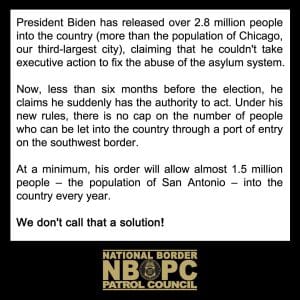Contrary to the false accusations being asserted by some, Border Patrol agents are not breaking the law or following unlawful orders. Instead, they are performing their duties in accordance with authorities designated under 8 USC §1357, 8 USC § 1101 (a)(18), and the other provisions of the Immigration and Nationality Act (INA), some of which are cited in this article.
Border Patrol agents patrol assigned areas of operation in between the ports of entry, at checkpoints, and other locations designated by the Border Patrol to identify, apprehend, and process aliens who they encounter entering or within the country illegally.
When an agent encounters an individual, the agent conducts an inspection in accordance with the 8 U.S. Code § 1225. If the alien indicates an intention to apply for asylum or expresses a fear of persecution, the agent is required under 8 USC § 1225 (b)(1)(A) to refer the individual for an interview with an asylum officer and the claim is noted on the applicable paperwork.
As for the myth repeated in certain circles, an individual does not have to appear at a port of entry to apply for asylum – see 8 USC § 1225(a)(1) and 8 USC §1158(a)(1). However, it is also worth noting that the government is not required to facilitate unlawful entries as this administration has been doing with its policies and its disgraceful battle with Texas for its efforts to secure the border.
ADJUDICATING ASYLUM CLAIMS
Border Patrol agents are not asylum officers and do not have the authority to adjudicate asylum claims. Some believe BP agents are conducting credible fear interviews because aslyum is noted on the processing paperwork, but that is noted is only an indication of the claim, not a validation or verification of the credibility of the claim.
Asylum interviews are conducted by asylum officers in accordance with 8 USC § 1225 (b)(1)(B). Asylum officers are defined in 8 USC § 1225 (b)(1)(E) and work under the direction of the US Citizenship and Immigration Services (USCIS) Asylum Division.
If the asylum officer determines the individual has a credible fear of persecution, 8 USC § 1225 (b)(1)(B)(ii) requires the individual to be detained pending further consideration of the application for asylum.
If the asylum officer determines the individual does not have a credible fear of persecution, the officer shall order the individual removed from the United States without further hearing or review in accordance with 8 USC § 1225 (b)(1)(B)(iii)(I). However, under 8 USC § 1225 (b)(1)(B)(iii)(III), the individual has a right to challenge the asylum officer’s determination before an immigration judge. Nevertheless, 8 USC § 1225 (b)(1)(B)(iii)(IV) requires the individual to be detained pending a final determination of credible fear of persecution and, if found not to have such a fear, until removed.
ADJUDICATING IMMIGRATION CASES
Border Patrol agents do not have the authority to adjudicate immigration cases.
Immigration cases are adjudicated by immigration judges from the Department of Justice Executive Office for Immigration Review (EOIR).
IMMIGRATION DETENTION
Border Patrol does not handle long-term immigration detention. Border Patrol facilities are only intended for short-term detention while individuals are processed.
The Immigration and Customs Enforcement (ICE) Enforcement and Removal Operations (ERO) oversees civil immigration detention in facilities nationwide to secure their presence for immigration proceedings or removal from the U.S.
As noted above, both 8 USC § 1225 (b)(1)(B)(ii) and 8 USC § 1225 (b)(1)(B)(iii)(IV) require the individual to be detained pending further consideration of the application or a final determination by an immigration judge. However, the administration is ignoring these provisions and instead releasing people into the country with a notice to appear at a hearing scheduled years into the future, prior to a final determination on their asylum case. Detention has consistently served as a deterrence for fraudulent asylum claims.
Another deterrent for fraudulent asylum claims was the Migrant Protection Protocols (MPP), also known as Remain in Mexico, that the administration rescinded. MPP was an effective means of avoiding long-term detention and deterring fraudulent asylum claims. Contrary to what some erroneously claimed, it was consistent with the provisions for a safe third-country provided by Congress in 8 USC §1158(a)(2)(A).
UNACCOMPANIED CHILDREN
The Homeland Security Act of 2002, Section 462, transferred responsibilities for the care and placement of unaccompanied children from the Commissioner of the Immigration and Naturalization Service to the Director of the Office of Refugee Resettlement (ORR), under the Department of Health and Human Services.
CONCLUSION
The administration implemented a reckless extortion scheme that was specifically intended to overwhelm the system, mislead the public , and ultimately pressure Congress to adopt its proposed reform, which mirrors the policies it implemented and does little to secure the border. The scheme commenced as soon as the administration fulfilled its promise by rescinding effective policies that deterred fraudulent claims and implementing policies that are inconsistent with the existing provisions of the INA to reward those who accepted his invitation to surge the border and claim asylum.
The administration’s disgraceful battle and disinformation campaign against Texas exposes this scheme. Texas is attempting to do what Border Patrol attemped to do up until this administration took over – deter unlawful entries, increase the likelihood of apprehension of those unlawfully entering, and redirect people to the ports of entry. For this reason, the National Border Patrol Council supports Texas and its efforts to secure the border.
The administration regularly asserts its interest in a humane, orderly, and secure immigration policy. However, if the administration was interested in a humane immigration policy, it would discourage and deter unlawful entries, where people risk injury or death and exploitation by criminal organizations, and instead require everyone to enter through a port of entry, which is also the safest and most orderly place for people to seek entry into the country.
Nevertheless, allegations of agents violating the law or participating in unlawful orders are false and unwarranted. Agents are required to perform their duties consistent with the authorities designated to them under the INA. They are caught in the middle of the administration’s extortion scheme and have been subjected to lies and vilified by the administration and its supporters in the press. They do not deserve to be labeled as traitors for adhering to the provisions of the INA that they were designated to uphold.
SOURCES:



